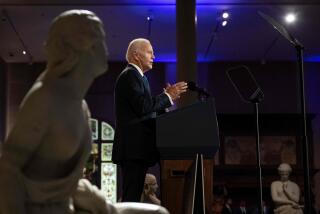U.S. Mission in Iraq May Be Vulnerable at Home
- Share via
WASHINGTON — Public support for a large, sustained U.S. involvement in Iraq has grown fragile, and leaders of both political parties should help shore it up to prevent a foreign policy catastrophe, according to a report released today by an influential think tank.
Citing polling data and anticipating future difficulties, the Council on Foreign Relations said President Bush, Democratic presidential challenger Sen. John F. Kerry and other political leaders should counter an erosion in support by committing themselves to a multibillion-dollar effort lasting at least several more years.
“We encourage all parties -- the president, Sen. Kerry, congressional leaders -- to recognize that this is a continuing American commitment,” said James R. Schlesinger, secretary of Defense in the Nixon and Ford administrations and co-chairman of the bipartisan task force of foreign policy experts who wrote the report.
“They need to sustain it because the effect of not sustaining it and failing in Iraq would be a substantial blow, if not catastrophic, for American foreign policy,” Schlesinger said in a telephone interview Monday.
The scheduled hand-over of power to a new Iraqi government on June 30 may lead Americans to think that the United States has turned the corner in Iraq and can begin to phase out its involvement, the report said.
“In fact, Iraq is entering an exceptionally challenging and dangerous phase, and sustained and determined U.S. engagement will be essential in the months and years to come,” the report concluded.
The Bush administration insists the United States will stay the course in Iraq, and Congress last year approved spending billions of dollars on the occupation. Nonetheless, “support among Americans may be broader than it is deep, and appears to be accompanied by some degree of impatience,” the report said.
In a nationwide poll taken in November, 60% of respondents said they thought the process of creating an Iraqi government was going too slowly, according to the report. That was before new obstacles complicated the effort to set up a transitional government to take sovereignty from the United States this summer.
Growing doubts about the rationale for war are also likely to affect public support, the report warned. In April, 70% of respondents to a Washington Post-ABC poll thought the war had been worth fighting. The figure dropped to 50% when the survey was repeated last month.
At the same time, Americans’ expectations for the success of the U.S. mission appear to be low. In a Harris poll last month, 73% of those surveyed said they thought it very or somewhat likely that the United States would “get bogged down for a long time in Iraq and not be able to create a stable government there.”
The report is a warning to policymakers and the public that the U.S. engagement in Iraq is too important to become a divisive domestic issue, said task force member Edward P. Djerejian, a former U.S. ambassador to Syria and Israel who directs the James A. Baker III Institute for Public Policy at Rice University.
“It’s an alert: Don’t let this get out of hand in an election year,” Djerejian said.
The report also calls on the United States to put greater emphasis on addressing pervasive unemployment in Iraq. And it draws particular attention to the need to manage Iraq’s oil sector and maintain accountability over oil revenue to ensure that the money is used to fund national reconstruction.
“This is very important because there’s been a history in the Arab world of oil wealth being siphoned off into private pockets and systematic corruption in various regimes,” Djerejian said.
Oil experts interviewed by task force members expressed concern that there had been insufficient progress in establishing financial controls and ensuring merit-based hiring in the oil sector.
In an unusual approach to the overall American effort, the report recommended that the Bush administration spend up to $40 million to offer incentives to civilian U.S. government employees willing to serve a year or more in Iraq. The incentive pay should be added to the ordinary danger pay offered to civil servants abroad, and should target Arabic-language speakers and Iraq experts, the report said.
The State Department has denied having problems recruiting staff members for Iraq duty, but the task force said the security situation has made it difficult to recruit for long-term assignments.
More to Read
Sign up for Essential California
The most important California stories and recommendations in your inbox every morning.
You may occasionally receive promotional content from the Los Angeles Times.










